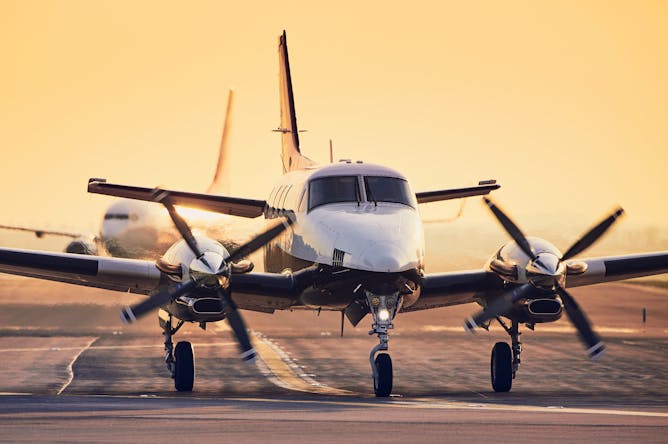|
In a little over five years, the regional plane pulling up to your airport gate could be a hybrid electric running on batteries. You’ll notice the quiet. You might not notice the drop in planet-warming greenhouse gas emissions.
Aviation is only about 3% of global emissions now, but flight traffic is picking up quickly, and forecasts suggest air travel could be producing three to five times more emissions by 2050 than before the COVID-19 pandemic. That’s why there’s a big push to develop electric planes now to cut back on high-carbon aviation fuel. They’re getting close – Air Canada just followed United Airlines in ordering hybrid-electric 30-seaters that could start arriving in 2028.
Aerospace engineer Gökçin Çınar, an assistant professor at the University of Michigan, develops sustainable aviation concepts, including hybrid electric planes and hydrogen fuel alternatives. We asked her how hybrid electric airplanes work and how soon we might see electric and hydrogen-fueled 737s in the sky.
Also today:
And one last note: The Conversation is brought to you as a public service for free. But it is not free to produce it, and your support helps pay for editors to work with academic authors and technology to distribute the articles. We hope you will support our work with a donation. Thanks!
|

Small planes are easier to electrify, but larger ones aren’t far behind.
Chalabala/istock via Getty Images
Gökçin Çınar, University of Michigan
Air Canada and United Airlines both have orders for hybrid electric 30-seaters. An aerospace engineer explains where electrification, hydrogen and sustainable aviation fuels are headed.
|
Science + Technology
|
-
Chris Impey, University of Arizona
Newly discovered super-Earths add to the list of planets around other stars that offer the best chance of finding life. An astronomer explains what makes these super-Earths such excellent candidates.
-
Maxim Lavrentovich, University of Tennessee
Nature begins forming patterns at the molecular level – and sometimes they grow to enormous sizes.
|
|
Ethics + Religion
|
-
Scott D. McDonald, Tufts University
A scholar of philosophy and foreign policy explains why Cardinal Zen poses a threat to the Chinese Communist Party as a competing source of political authority.
|
|
Environment + Energy
|
-
Rick Thoman, University of Alaska Fairbanks
Most of the flooded communities are Indigenous and rely on subsistence hunting that residents would normally be doing right now. Recovering from the damage will make that harder.
|
|
Politics + Society
|
-
Amy Werbel, Fashion Institute of Technology (FIT)
US history suggests that Republican efforts to restrict reproductive rights will be difficult to enforce and widely reviled, undermining their effectiveness – and ultimately causing their demise.
-
Julia Khrebtan-Hörhager, Colorado State University; Evgeniya Pyatovskaya, University of South Florida
The far-right leader of the Brothers of Italy has tried to distance the party from its fascist lineage, but many are still worried about the direction she will take the country.
-
Keith Raymond Harris, Ruhr University Bochum
Worrying about how many people believe false ideas misses the real danger – that people are influenced by them whether they believe them or not.
|
|
Economy + Business
|
-
Hala Altamimi, University of Kansas; Qiaozhen Liu, Florida Atlantic University
Two scholars found that when arts nonprofits devote 35% of their budget to overhead, they fare best in terms of attendance.
|
|